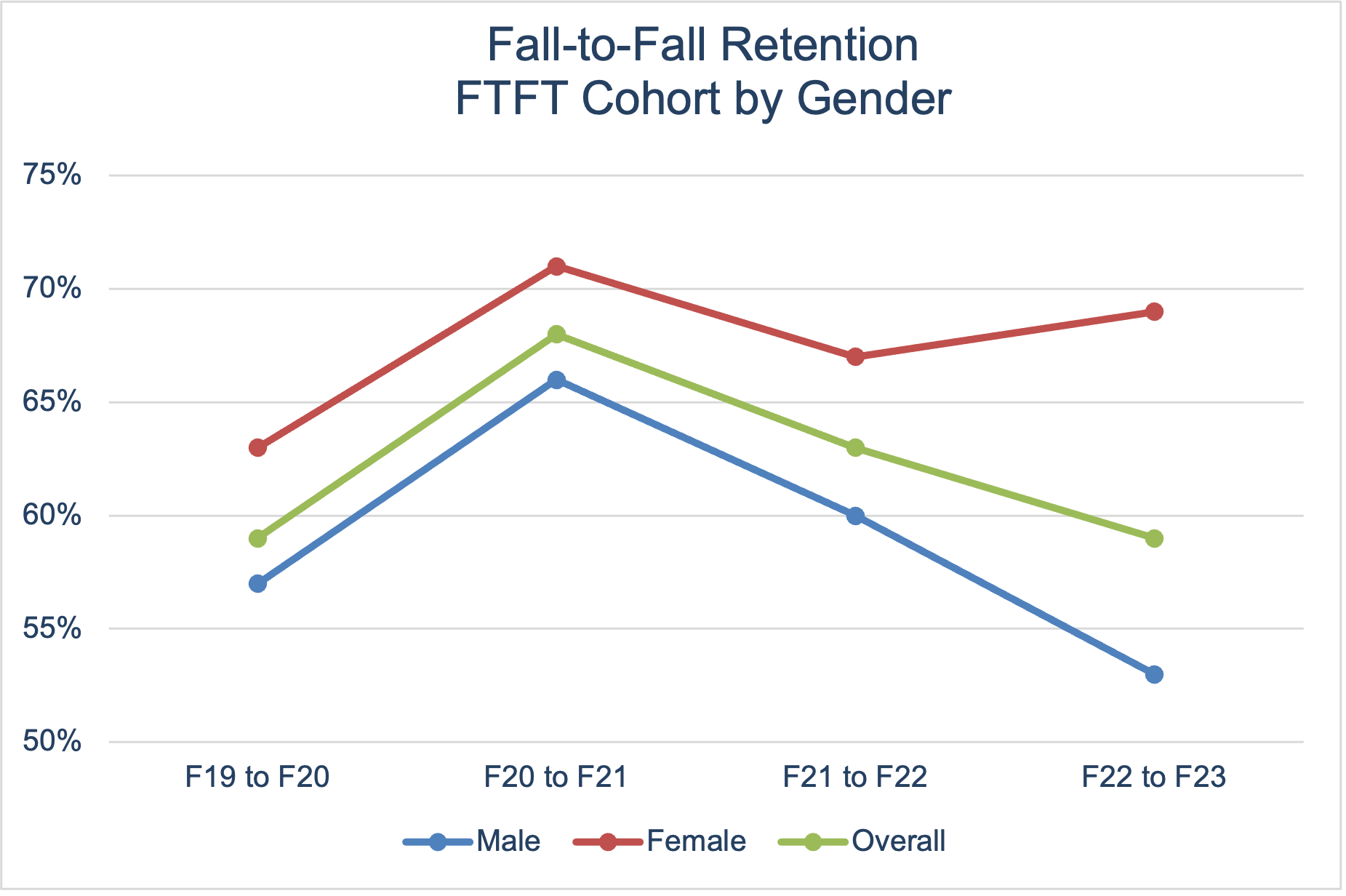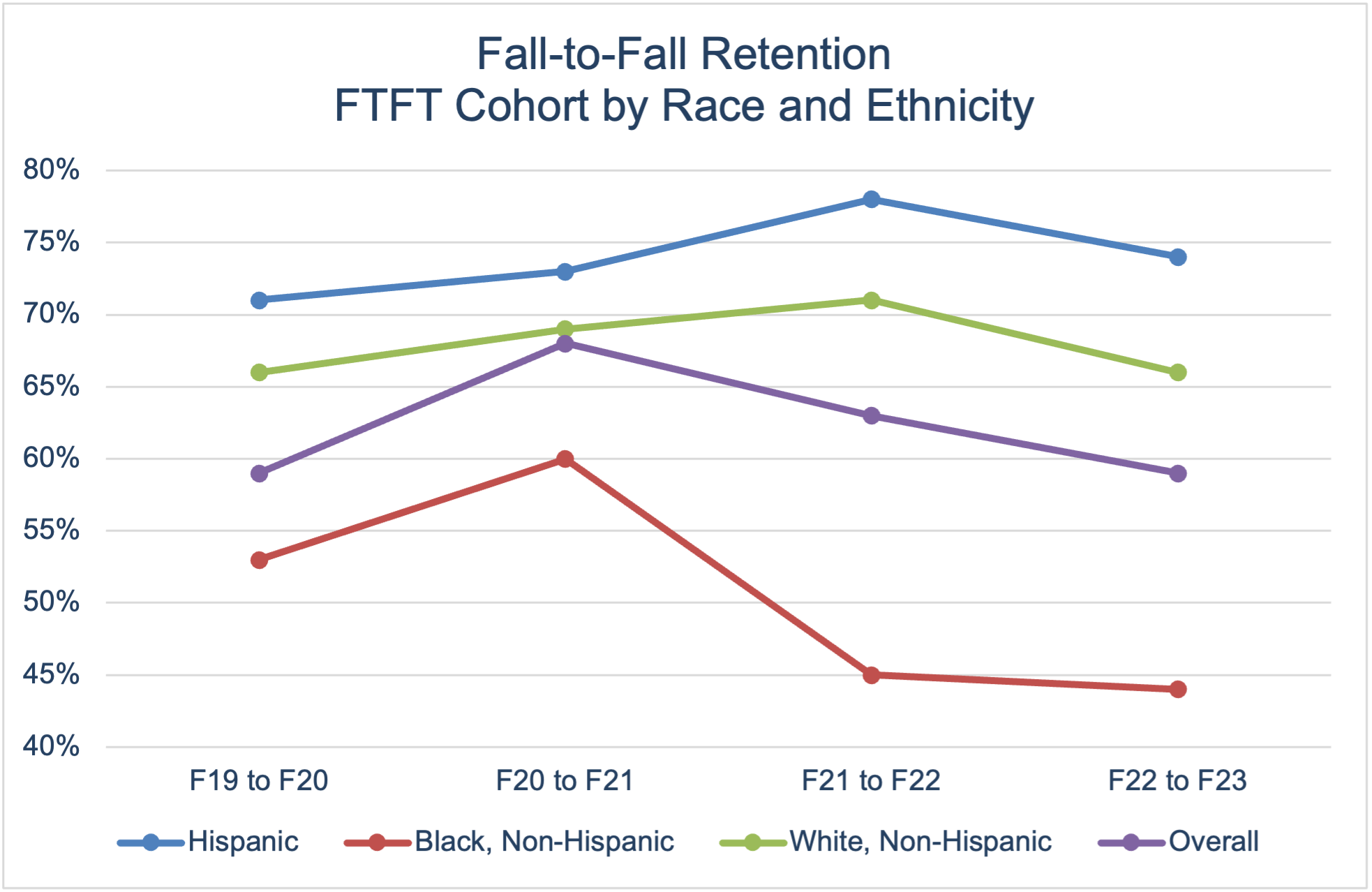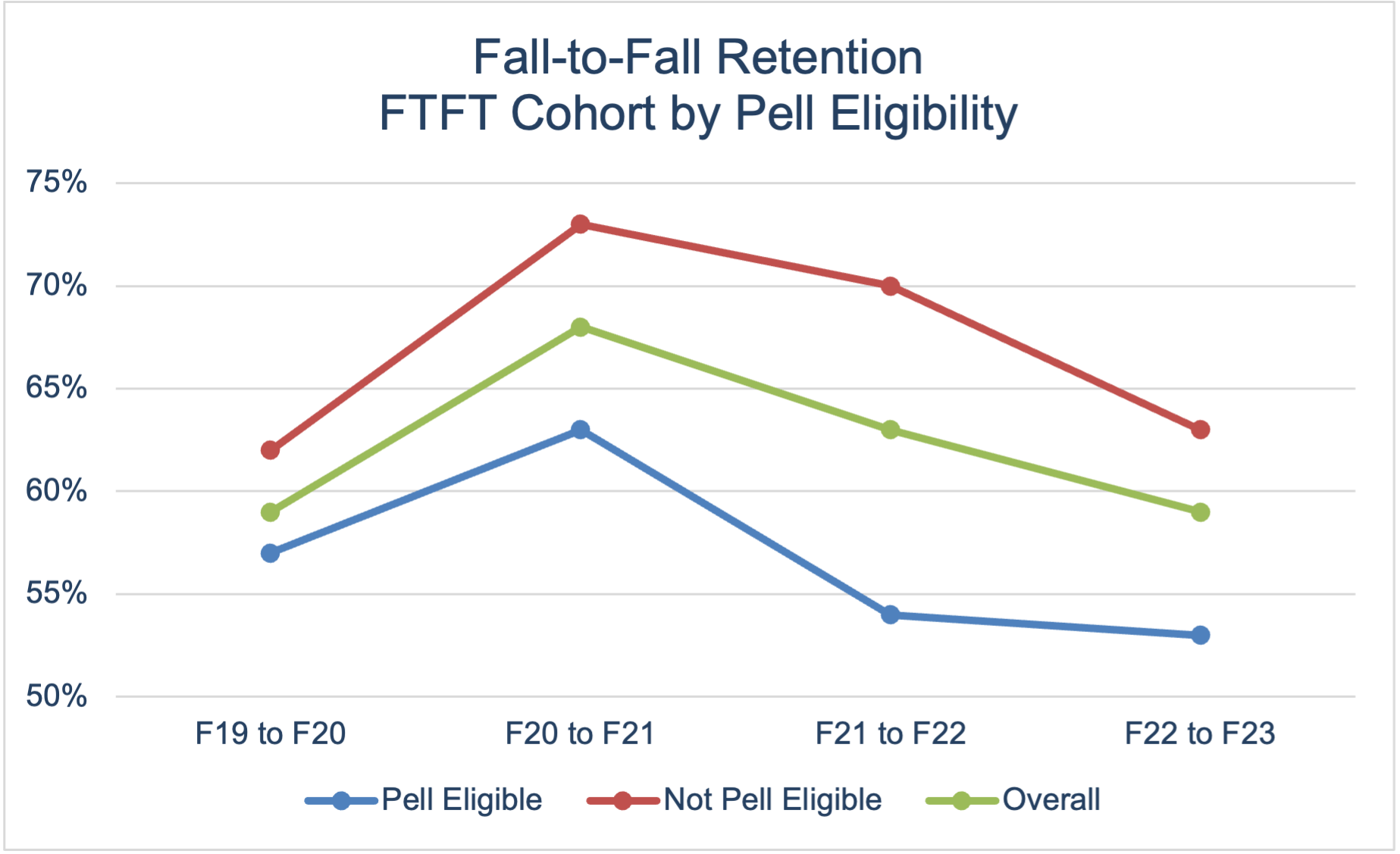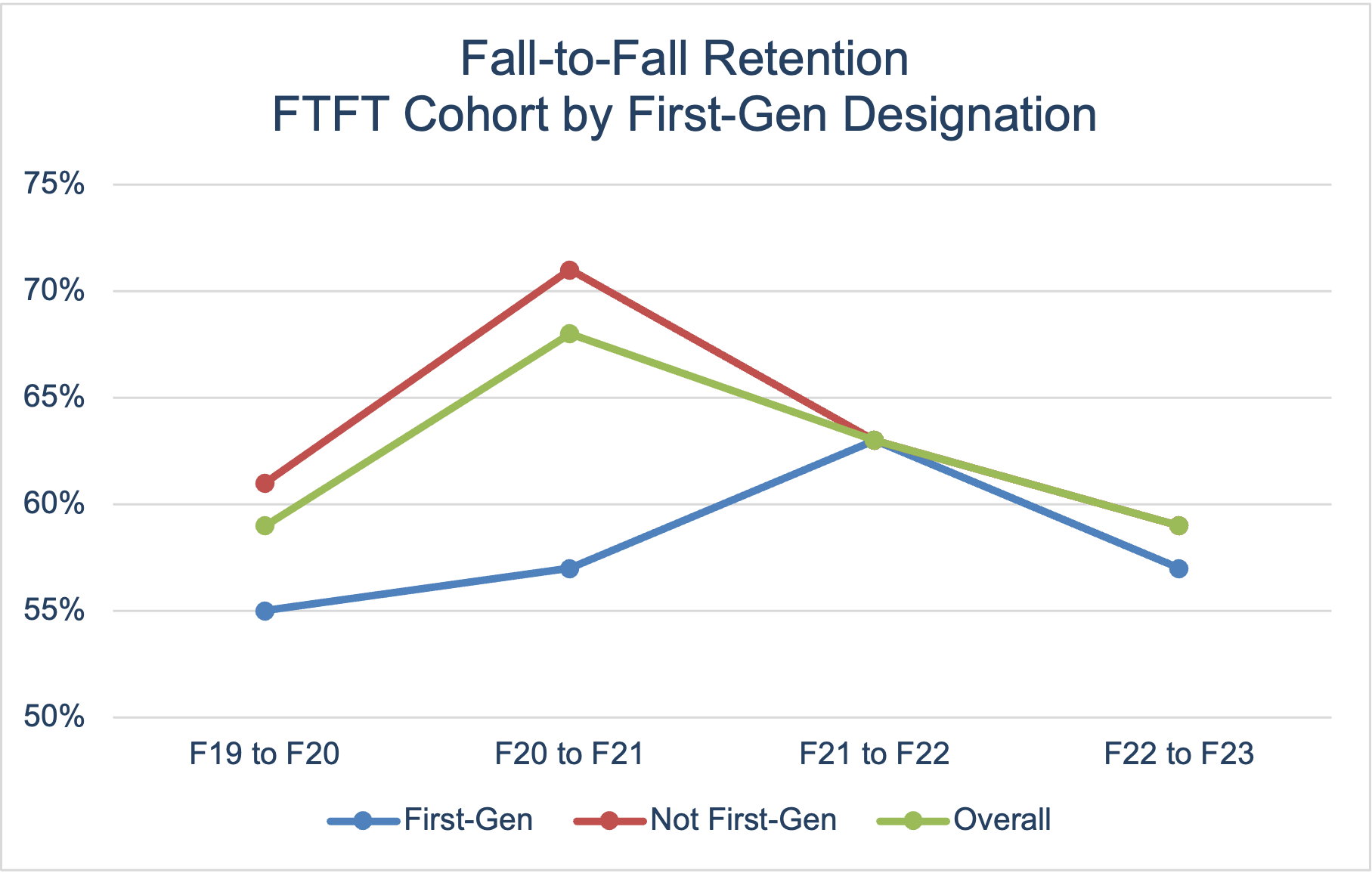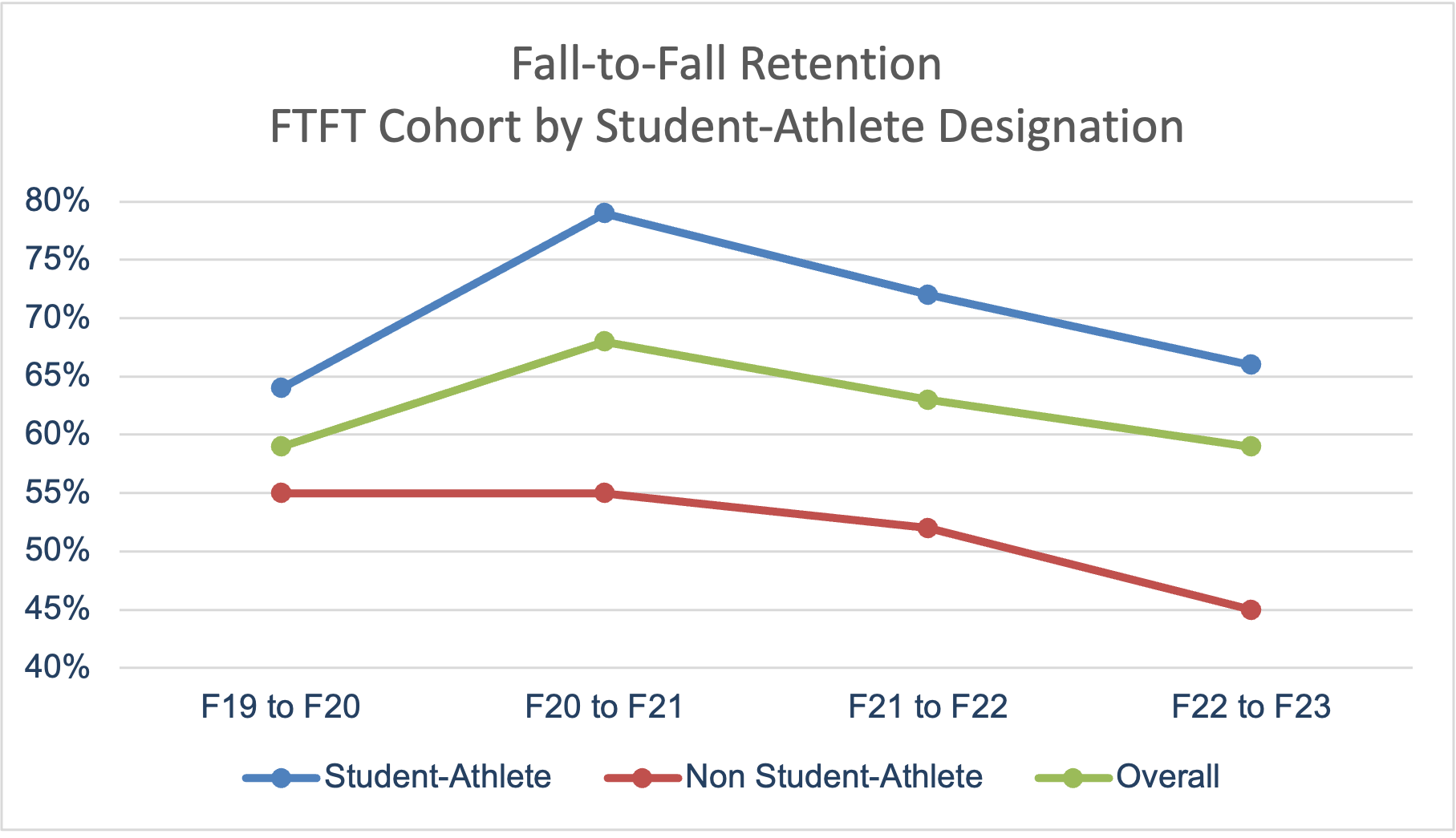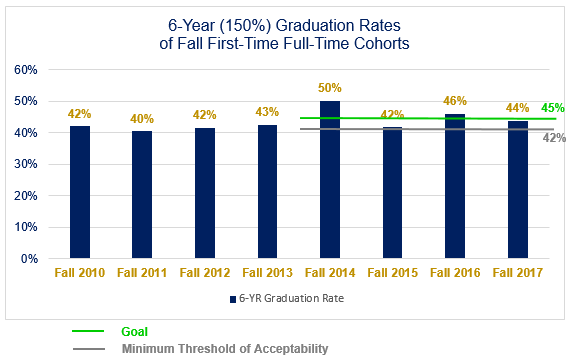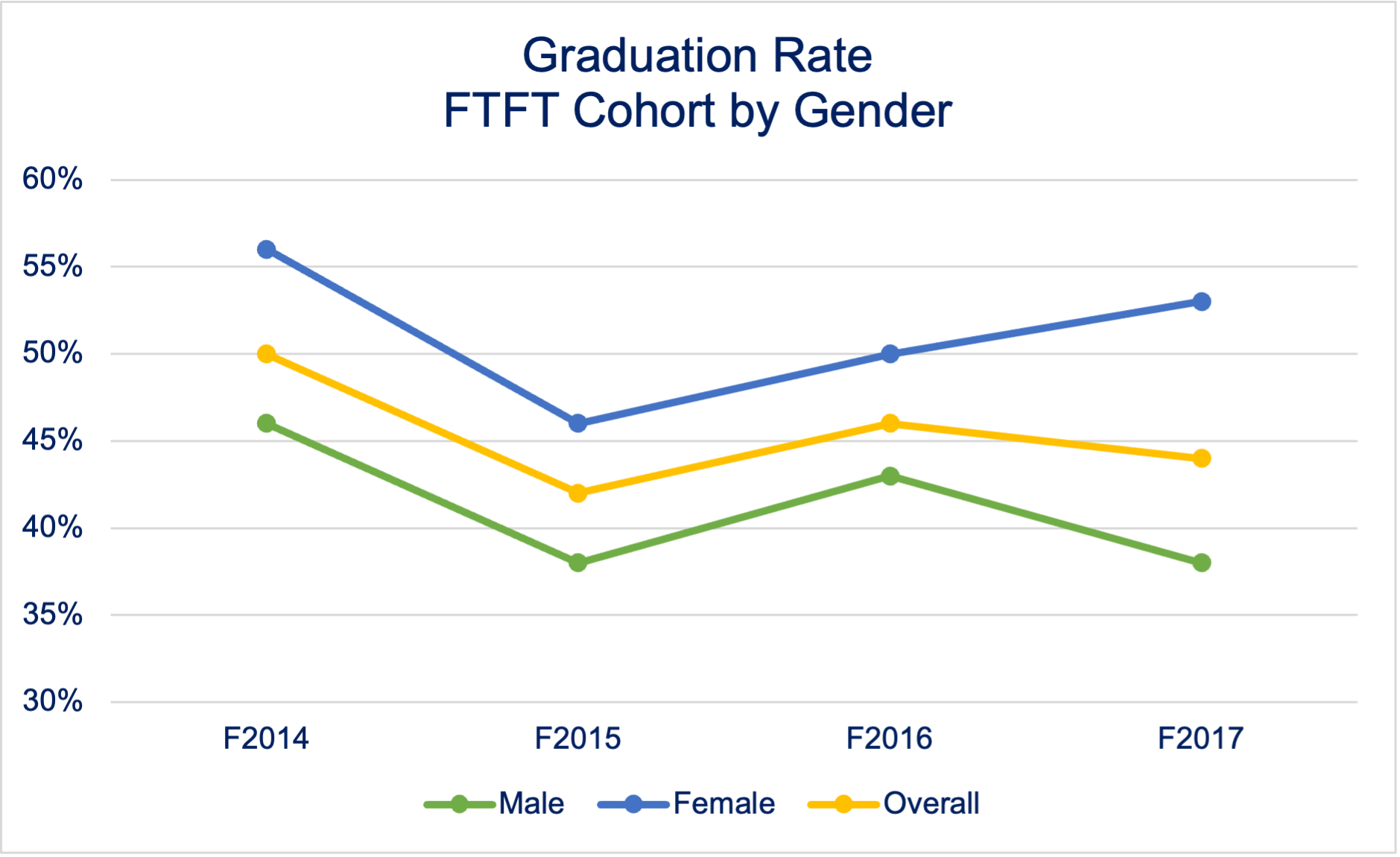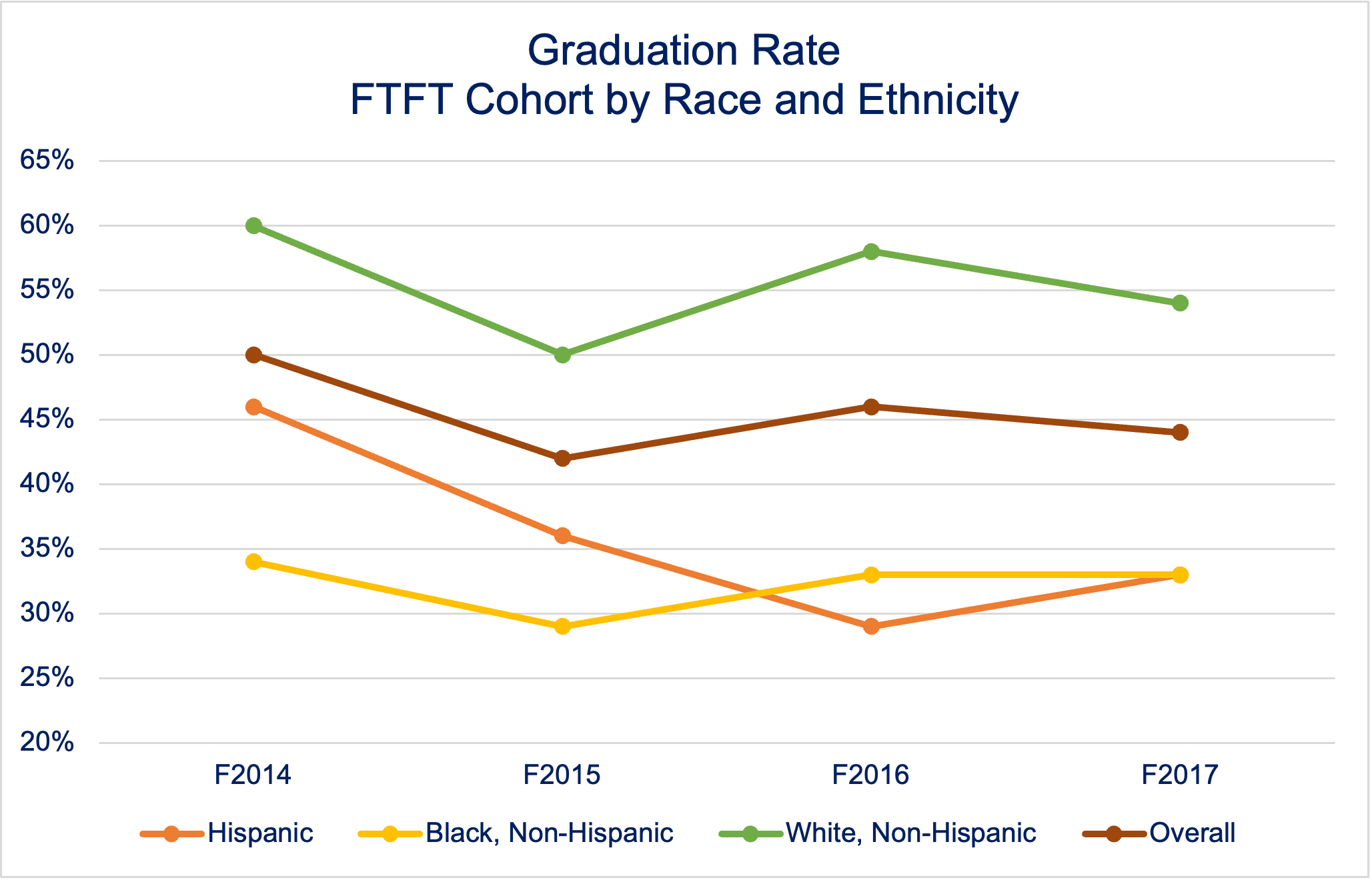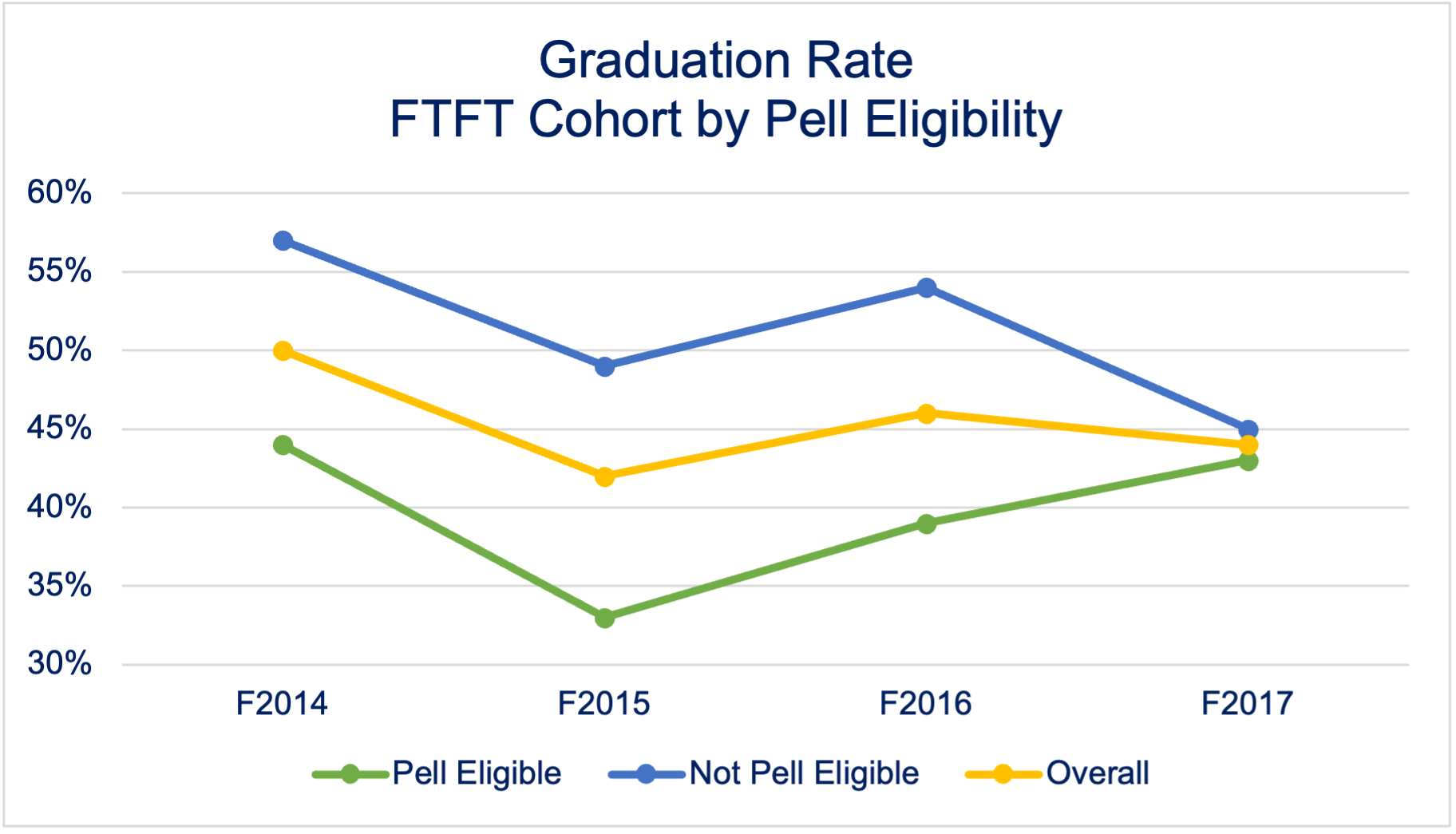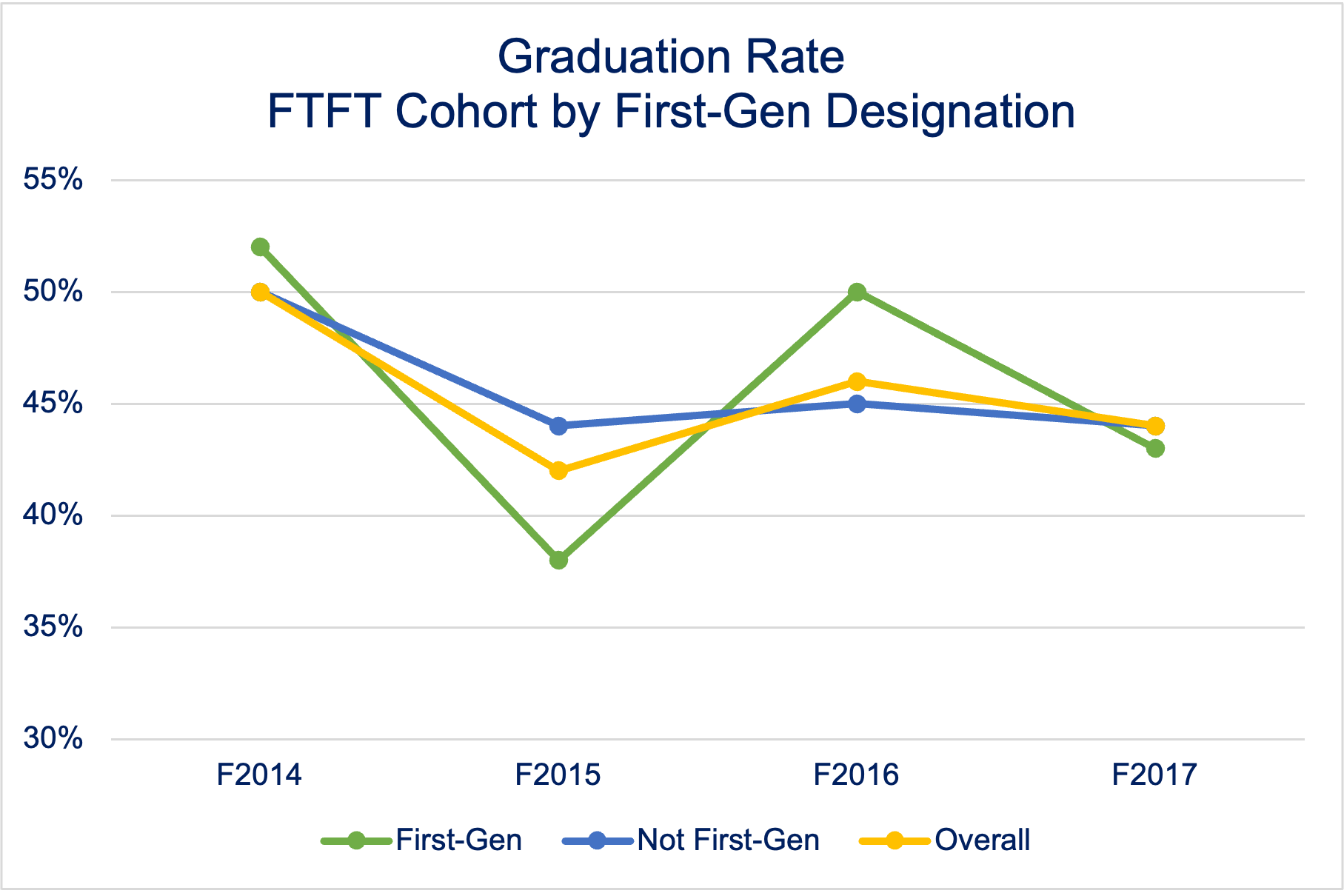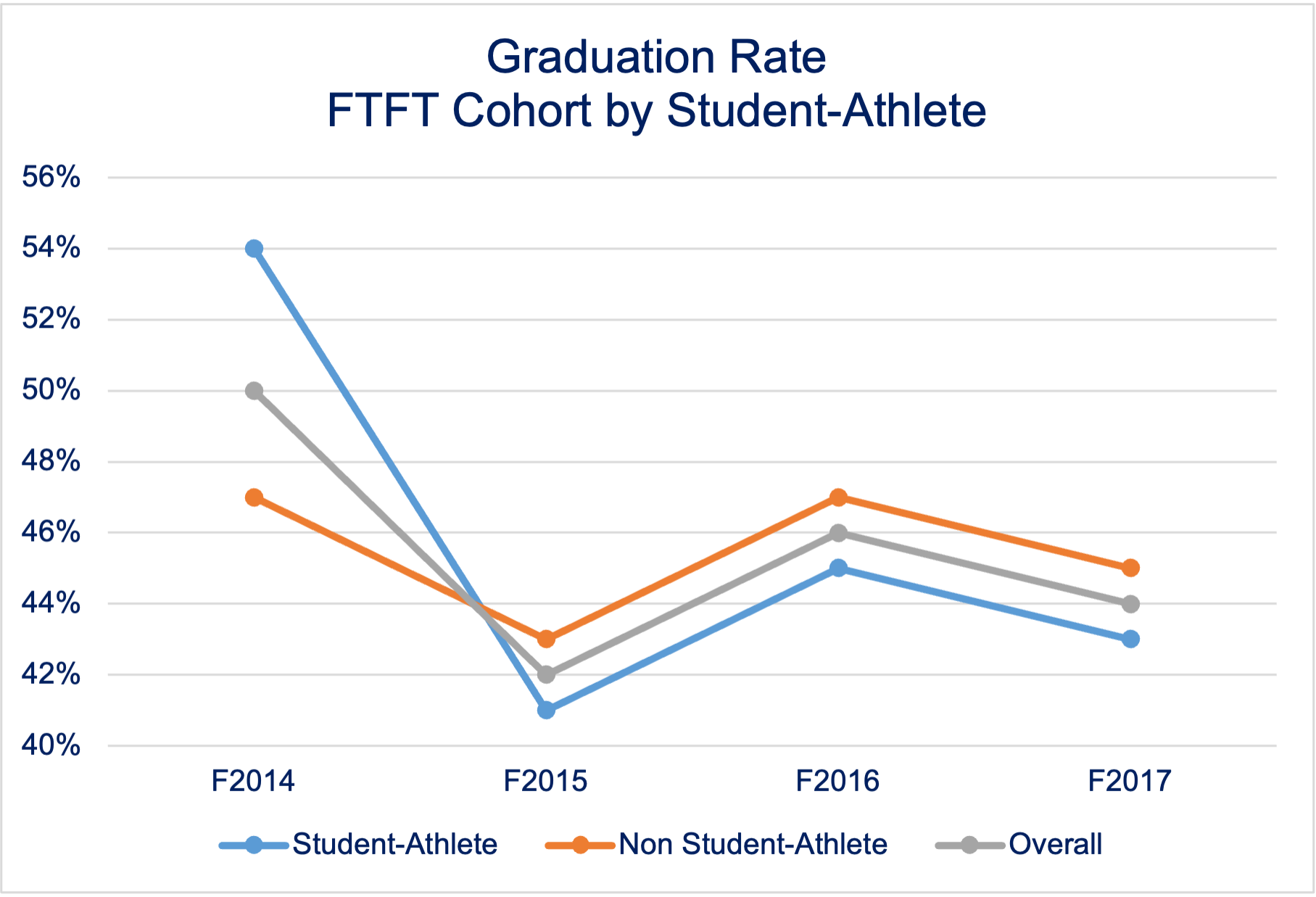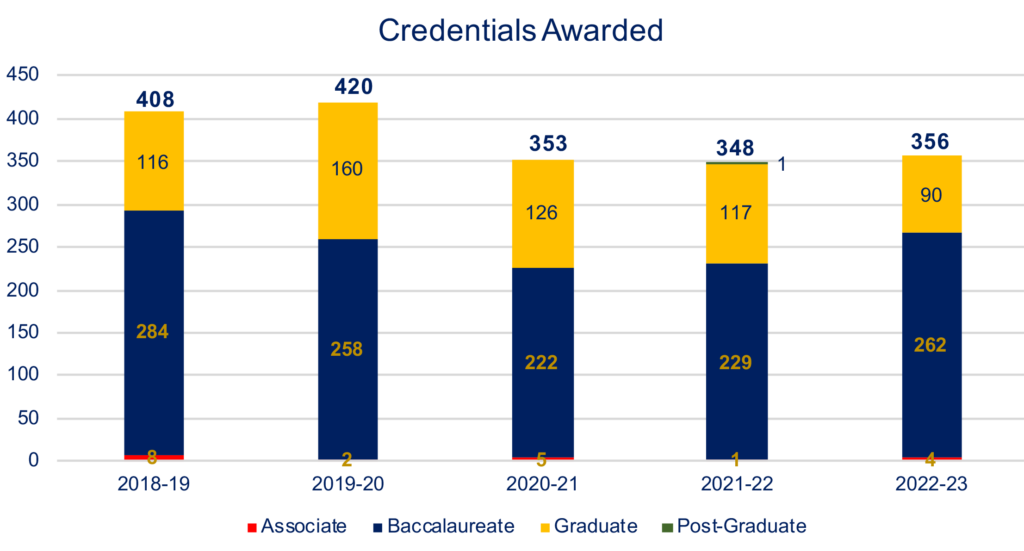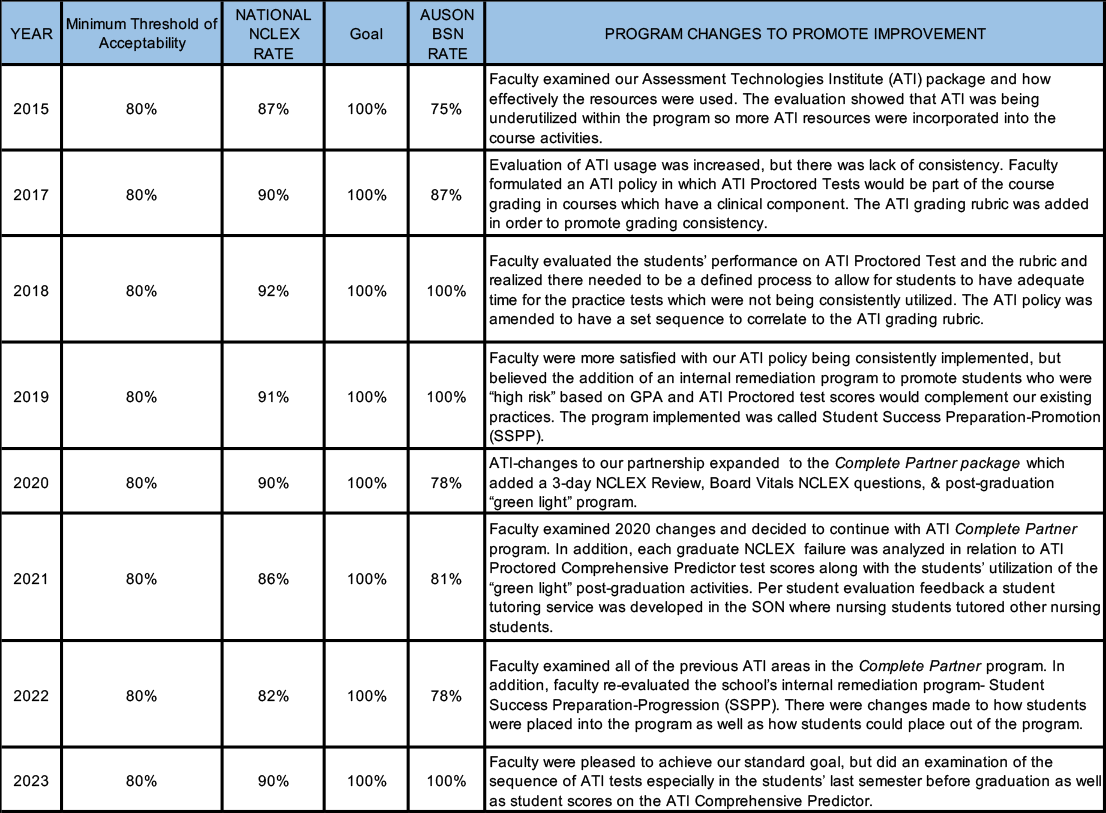Student Achievement at Averett University
Averett University has identified multiple metrics to monitor and evaluate student achievement. As Averett educates a diverse population of undergraduate- and graduate-level students, metrics are further disaggregated by characteristics which support the institutional goals set in the Averett 2025 Strategic Plan: “Bigger Dreams, Bolder Futures,” the students served by the University, and the programs offered.
The results are regularly evaluated to determine strategic initiatives which can be implemented to foster improvement in each key area.
Fall-to-Fall Retention
First-Time Full-Time Retention Rate
This metric assesses the rate at which entering first-time full-time undergraduate-level degree-seeking students enrolled at Averett University in each Fall semester return the following Fall semester. Using the prior 4-year average retention rate (Fall 2015, 2016, 2017 and 2018 cohorts), in the spring of 2020, Averett established a minimum threshold of acceptability at 62%. Averett’s goal for this student achievement metric is 65%.
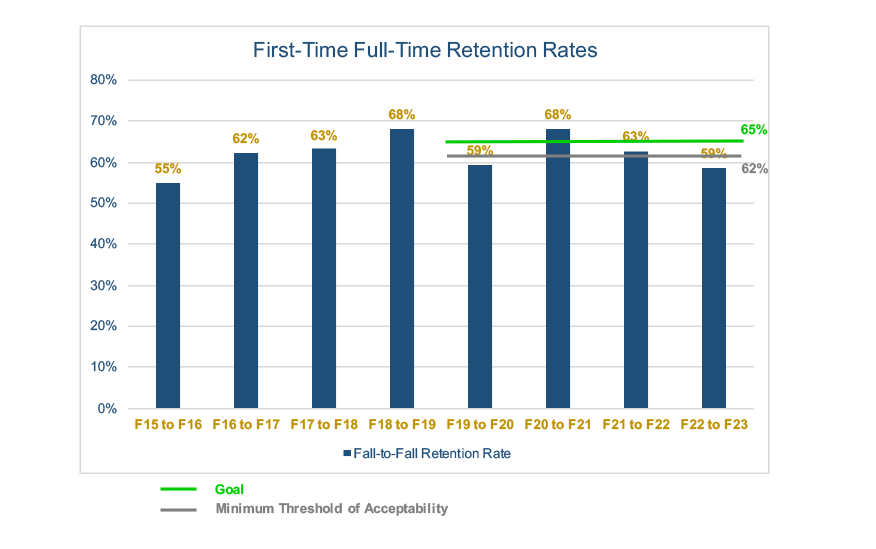 The minimum threshold of acceptability was achieved with the Fall 2020 (68%) and Fall 2021 (63%) cohorts, but was not met with the Fall 2019 (59%) and Fall 2022 (59%) cohorts. The desired goal of 65% was exceeded with the Fall 2020 (68%) cohort.
The minimum threshold of acceptability was achieved with the Fall 2020 (68%) and Fall 2021 (63%) cohorts, but was not met with the Fall 2019 (59%) and Fall 2022 (59%) cohorts. The desired goal of 65% was exceeded with the Fall 2020 (68%) cohort.
Current initiatives
In Fall 2021, Averett University implemented the Moving the Needle project. This is a comprehensive, integrated, campus-wide initiative to advance goals for student success and retention. There are four (4) modules of this project: 1) Clearance, 2) First-Year Experience, 3) Academic Advising, and 4) Academic Support. The Clearance module team reviews and makes improvements to the process around students being “clear” for registration, seeking an increase in the number of students who are “clear” prior to the first day of class every term. The First-Year Experience module team has designed a comprehensive approach that guides students from acceptance through their first semester of their second year. The Academic Advising and Academic Support module teams continue to integrate support services into the student experience to assist with navigation, choices, and intervention strategies.
A key area of focus for Averett University is affordability. Averett took a deeper dive into key financial indicators, and committed to offering a Tuition Freeze for AY2024-2025. This strategic initiative “will allow even more individuals the ability to receive an education that will transform their lives.”
Implementation of a new Student Information System (SIS) will enhance the Advising process as students and advisors will be able to track progress to completion, review program requirements and options, and view course rotations.
Other Retention
As Averett University educates a diverse population of students, through both on-campus predominantly face-to-face and distance education programs, the following demographics have been identified for evaluation: 1) Gender, 2) Race/Ethnicity, 3) Pell Eligibility, 4) First-Gen designation, and 5) Student-Athlete designation. Program Modality is also reviewed; however, the first-time full-time distance education sub-cohort is not statistically significant (n < 5).
Graduation Rates
First-Time Full-Time 6-Year (150%) Graduation Rate
Averett University offers a variety of four-year baccalaureate degree programs. This metric assesses the rate at which entering first-time full-time undergraduate-level degree-seeking students enrolled at Averett University in each Fall semester graduate within 6 years (or 150% of program length). Using the prior 4-year average graduation rate (Fall 2010, 2011, 2012 and 2013 cohorts), in the spring of 2020, Averett established a minimum threshold of acceptability at 42%. Averett’s goal for this student achievement metric is 45%.
The minimum threshold of acceptability was achieved with the Fall 2014 (50%), Fall 2015 (42%), Fall 2016 (46%), and Fall 2017 (44%) cohorts. The desired goal of 45% was also achieved with the Fall 2014 (50%) and Fall 2016 (46%) cohorts.
In addition to the focus areas of finances and academics, Averett University also focuses on personal well-being. There is an on-campus Health and Wellness Center, and a Counseling Center. Both centers collect qualitative data in the form of “client” feedback to help inform the services and programming to support the students. There is indication that the retention initiatives which have been introduced are creating a positive effect on graduation rates, demonstrated by an overall increase in graduation rates of the Fall 2014 to Fall 2017 cohorts, as compared to the prior four cohorts.
Other Graduation Rates
As Averett University educates a diverse population of students, through both on-campus predominantly face-to-face and distance education programs, the following demographics have been identified for evaluation: 1) Gender, 2) Race/Ethnicity, 3) Pell Eligibility, 4) First-Gen designation, and 5) Student-Athlete designation. Program Modality is also reviewed; however, the first-time full-time distance education sub-cohort is not statistically significant (n < 5).
Pass Rates
Averett University (AU) offers academic programs which are designed to prepare students for a career in a licensed profession upon completion of the program. A professional licensure or certification is typically required for graduates in these programs to practice and/or gain employment in these fields.
Aerospace Management: FAA Practical Exam with Certification
Averett University’s Bachelor of Science (BS) in Aviation (Aerospace) Management with a Concentration in Flight Operations, and AU’s Bachelor of Science (BS) in Aerospace Management and Criminal Justice are certified by the Federal Aviation Administration (FAA) as an Aviation Science under 14 CFR Part 141. The programs meet the requirements and qualify graduates to sit for the FAA Practical Exam in all 50 states. If the student passes the exam, they are then certified as a pilot by the FAA.
The FAA requires a minimum 80% combined score across all courses for the student to pass and be certified as a pilot by the FAA. The FAA reviews pass rates biennially as part of the re-certification. FAA expects a biennial pass rate of 80%. The minimum threshold of acceptability is 80% for first-time pass rates.
Averett University strives to be one of the best Part 141 training schools in the United States. Therefore, the Aeronautics Flight Training staff aim to achieve a first-time pass rate of 88%.
- Minimum Threshold of Acceptability = 80%
- Goal = 88%
The minimum threshold of acceptability was met for biennium years 2017-2018, 2019-2020, and 2021-2022. The goal of 88% has not yet been achieved.
There is a direct correlation between the pass rates and the size of the classes. Scores were higher when the student to instructor ratio was smaller. As the class size grew the pass rate went down; conversely, if the class size remained relatively small, the pass rate increased. This analysis informed the department to add additional classes each semester. The department uses 30 as maximum class size.
As the Aerospace Management program continues to grow, the department also acknowledges the importance of one on one time with the flight instructor. Therefore, the department has hired additional flight instructors. The pass rates have been consistent by focusing on time spent and knowledge sharing with the students.
Traditional BSN Track NCLEX-RN
Averett University School of Nursing (AUSON) offers a Traditional Bachelor of Science in Nursing (BSN) on-ground face-to-face modality program which is accredited by the Commission on Collegiate Nursing Education (CCNE) and approved by the Virginia State Board of Nurses (VBON) Registration and Nursing Education. This program prepares students to sit for the national NCLEX-RN examination for licensure to become a Registered Nurse (RN).
AUSON has a minimum threshold of acceptability of 80%. (This is a VBON standard percentage to meet regulatory guidelines.) AUSON’s goal is that 100% of graduates will pass the NCLEX-RN examination on the first attempt. AUSON also compares its pass rates to the National NCLEX pass rate for each calendar year.
The minimum threshold of acceptability was not met in calendar years 2015, 2020, and 2022. The minimum threshold of acceptability was met for calendar years 2017, 2018, 2019, 2021, and 2023. The goal of achieving 100% pass rate was also achieved in calendar years 2018, 2019, and 2023.
ABSN NCLEX
Averett University School of Nursing (AUSON) offers an Accelerated Bachelor of Science in Nursing (ABSN) distance education modality (with in-person requirements) program which is accredited by the Commission on Collegiate Nursing Education (CCNE) and approved by the Virginia Board of Nurses (VBON) Registration and Nursing Education. This program prepares students to sit for the national NCLEX-RN examination for license to become a Registered Nurse (RN).
AUSON has a minimum threshold of acceptability of 80%, (This is a VBON standard percentage to meet regulatory guidelines.) AUSON’s goal is that 100% of graduates will pass the NCLEX-RN examination on the first attempt. AUSON also compares its pass rates to the National NCLEX pass rate for each calendar year.
The minimum threshold of acceptability was met in calendar years 2022 and 2023 and the inaugural cohort of completers for calendar year 2022 had a 100% pass rate.
FNP
Averett University School of Nursing (AUSON) offers two programs: Master of Science in Nursing (MSN) and Post-Graduate Advance Practice Registered Nurse (APRN) Certificate, both in Family Nurse Practitioner (FNP). These programs prepare students to sit for the American Nurses Credentialing Center (ANCC) or the American Association of Nurse Practitioners (AANP) national certification examination.
AUSON has a minimum threshold of acceptability of 80%. AUSON’s goal is that 100% of graduates will pass the FNP certification examination on the first attempt.
- Minimum Threshold of Acceptability = 80%
- Goal = 100%
The minimum threshold of acceptability was not met in calendar year 2021. The minimum threshold of acceptability was met in calendar year 2022.
The inaugural cohort of FNP students completed the program in the 2021 calendar year. Following examination preparation sessions, students who were not successful at passing the national examination on their first attempt were successful on the second attempt.
Graduate Nursing weaves Advanced Practice Education Associates (APEA) test preparation questions into the curriculum. Monthly meetings with the Graduate Nursing faculty and support staff have been implemented to review student progression. Graduate Nursing faculty use the results of the APEA performance scores to identify content remediation and to offer examination preparation sessions focused on areas of improvement.
As new national standards are established, the Graduate Nursing faculty revise the curriculum through the appropriate curriculum approval process, to meet the new standards. Other curriculum revisions are submitted through the appropriate curriculum approval process for content remediation to support student progression and success. The curriculum underwent revisions in 2023 to meet new standards, remediate content, and support student achievement.
Education
Averett University’s Education Department offers multiple baccalaureate-level on-ground face-to-face modality and graduate-level distance education modality programs accredited by the Council for Accreditation for Educator Preparation (CAEP) and approved by the Virginia Department of Education (VDOE). The Averett University Educator Preparation Programs prepare aspiring elementary and secondary educators for success in passing licensure exams, including the Virginia Communication and Language Assessment (VCLA), Praxis II Subject Assessment, and Praxis Teaching Reading examinations required for initial teacher licensure.
The Educator Preparation Programs have a minimum threshold of acceptability of 80% (This is a VDOE standard percentage to meet regulatory biennial guidelines.) The Education Department’s goal is that all programs with licensure exams will have a 100% percent first-time pass rate on their licensure exams. The Education Department compares its pass rates to statewide results reported by the VDOE every other calendar year.
- Minimum Threshold of Acceptability = 80%
- Goal = 100%
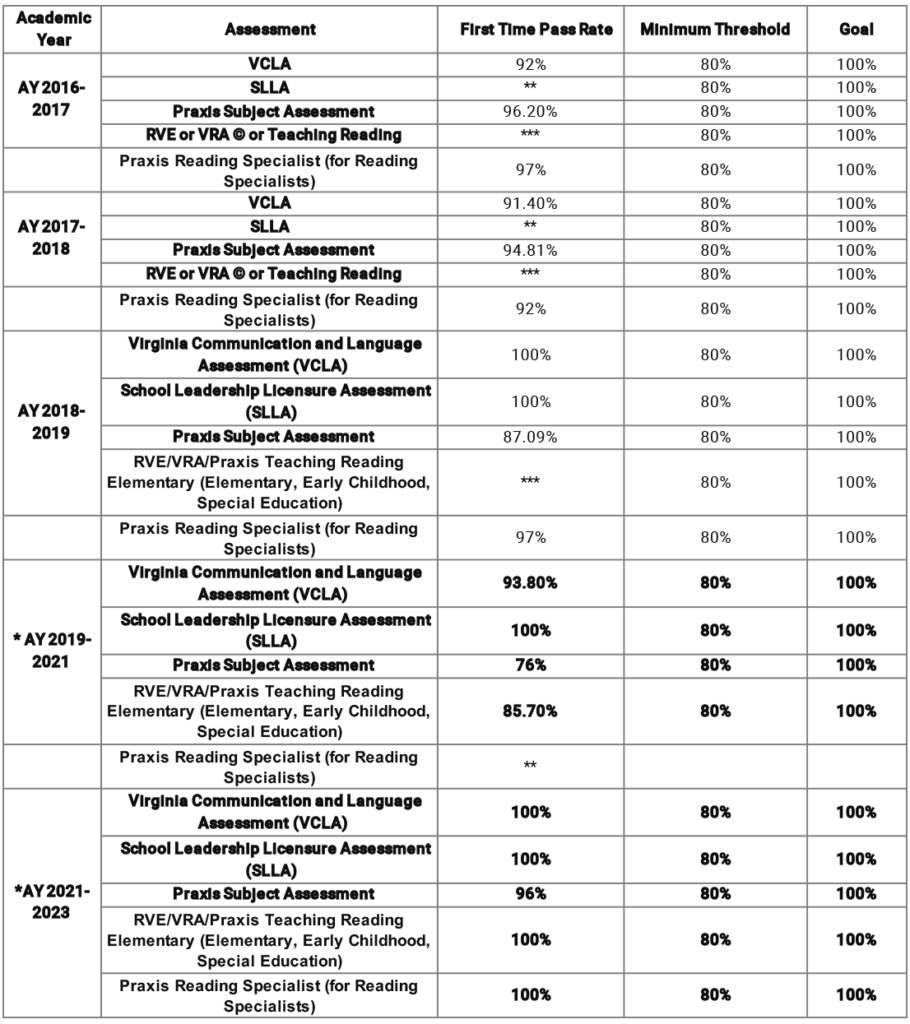
* The current Regulations Governing the Review and Approval of Education in Virginia became effective August 23, 2018; therefore, the 2018-2019 data is the first biennial report under these regulations. This collection reflects program completers and newly reported program noncompleters. The number of program completers less than ten rolled over from the previous biennial reporting period. If the total number of "program completers" and "program noncompleters" is less than ten for an approved education (endorsement) program for the 2019-2021 period, the number will be rolled over to the next biennial report.
** No findings reported for this cycle.
*** Test was not available until 2022
To support the goal, a Teacher Work Sample has been implemented for initial licensure students. Additionally, courses have been revised to align with the Science of Reading in accordance with the Virginia Literacy Act. In 2024, guidelines were developed for initial licensure students to complete Praxis assessments following specific courses, in an effort to improve pass rates.
Substance Abuse Counseling
Averett University's Bachelor of Arts (BA) or Bachelor of Science (BS) degree in Psychology with a concentration in Substance Abuse Counseling is designed to meet the Certified Substance Abuse Counseling (CSAC) education requirements in Virginia as outlined by the Virginia Department of Health Professions. In addition to didactic coursework, those seeking to become a certified substance abuse counselor, must successfully pass the state certification exam and complete 2000 hours of work experience within the profession under an approved clinical supervisor.
The concentration in Substance Abuse Counseling launched in Fall 2022. There have not yet been any completers of this program.
Institutional Profile Info
The State Council of Higher Education for Virginia (SCHEV) publishes Student Achievement data in accordance with House Bill HB886 of Virginia. Information, such as, post-completion employment, enrollment in graduate education, and wages for each institution in the Commonwealth are found on the page linked below.
The Integrated Postsecondary Education Data System (IPEDS) also publishes Student Achievement data. Statistics, such as, number of degrees and credentials awarded, retention rates, graduation rates, transfer out rates, outcome measures [sub-cohorts of undergraduate students: first-time full-time; first-time part-time; non-first-time full-time; non-first-time part-time] are included on the page linked below.
